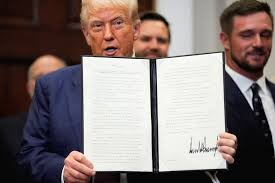
TRUMP CRIPPLES PHARMACEUTICAL INDUSTRY
In a bold move that has sent shockwaves through the global drug industry, Donald Trump announced the imposition of 100-percent tariffs on all branded imported pharmaceuticals, unless companies commit to building manufacturing plants in the United States. With only five days left before these significant tariffs take effect, analysts and industry insiders are scrambling to assess the potential fallout. This decision isn’t just a trade tactic; it’s an attempt to shake up the U.S. pharmaceutical landscape by reshoring jobs and stimulating domestic production.
Let’s unpack what this all means. For starters, 100-percent tariffs on imported drugs could double the price of essential medications for American consumers. Imagine walking into a pharmacy and seeing your lifesaving prescriptions costing twice as much overnight. The prospect is alarming, especially for those reliant on affordable medications. However, the administration views this as a necessary step to boost American manufacturing and create jobs in an industry that has been criticized for outsourcing production to lower-cost countries, primarily in Asia.
In the thick of it, some countries, notably the European Union, claim they’re protected from these tariffs thanks to previous trade agreements. Their entry into the fray adds another layer of complexity to an already convoluted trade landscape. It raises questions about how American pharmaceutical companies that rely on European suppliers will react. Will they be forced to shift their supply chains or face skyrocketing costs and potential shortages of critical drugs?
Moreover, the sheer scale of these tariffs poses a challenge for global pharmaceutical firms that have historically relied on international markets. Companies must now weigh their options: invest heavily in U.S. facilities or face crippling tariffs that could render their products unaffordable. It’s a stark reminder of how interconnected the global economy is and how a single policy can ripple through markets and affect countless lives.
So, what’s next? As the deadline looms, we can expect significant maneuvering from pharmaceutical giants, looking to navigate this new landscape while maintaining profitability and ensuring access to vital medications. In the end, this trade war over drugs could reshape not just where pills are made, but also how accessible and affordable they are for Americans. As we watch this play out, one thing is clear: the global drug industry is in for a wild ride.
3 Comments

John Doe 01 Jan 2045
Diam amet duo labore stet elitr invidunt ea clita ipsum voluptua, tempor labore accusam ipsum et no at. Kasd diam tempor rebum magna dolores sed sed eirmod ipsum.

John Doe 01 Jan 2045
Diam amet duo labore stet elitr invidunt ea clita ipsum voluptua, tempor labore accusam ipsum et no at. Kasd diam tempor rebum magna dolores sed sed eirmod ipsum.

John Doe 01 Jan 2045
Diam amet duo labore stet elitr invidunt ea clita ipsum voluptua, tempor labore accusam ipsum et no at. Kasd diam tempor rebum magna dolores sed sed eirmod ipsum.

.png)
.png)
.png)
.png)
.png)
.png)




